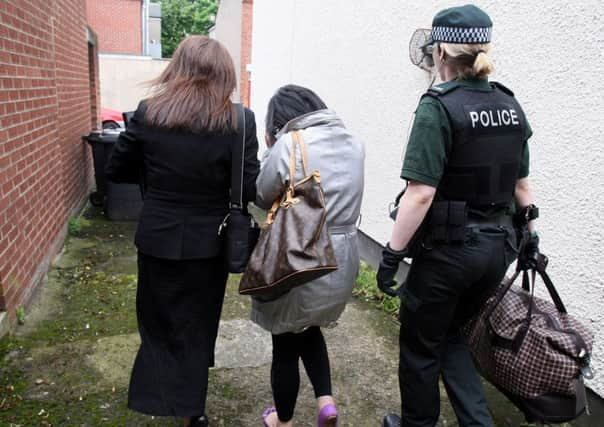Womens Aid coalition reject QUB’s prostitution report for DoJ


The report said the sale of sex in Northern Ireland has increased since a new law in 2015 made it illegal.
The Department of Justice commissioned the School of Law at Queen’s University Belfast to review the effectiveness of the law.
Advertisement
Hide AdAdvertisement
Hide AdThe report said there had been a 5% increase in NI adverts of women on a leading sex trade website since the law came in.
However, author Rachel Moran, a Dubliner who says she was groomed into the sex trade as a minor, said she found the report “unrepresentative of the prostituted population”.
Most women in prostitution on the island of Ireland, she said, are migrants, while the few Irish women are mostly “socially and educationally disadvantaged”. Yet the report’s figures found that 40% of women in the Irish sex trade had third-level qualifications, and half them claimed to be Northern Irish or English. As a result she queried how reliable such an anonymous online survey could be. Now a campaigner against prostution, she gave evidence to MLAs in support of the law.
Women’s Aid Northern Ireland, meanwhile, responded that they are supporting “more and more” victims of sexual exploitation and trafficking.
Advertisement
Hide AdAdvertisement
Hide Ad“Whilst this report indicates that women have a choice and are content to live this lifestyle, it could not be further from the truth,” it said.
“The women we support are traumatised and abused and have long-term psychological ill health as a result of their ordeals.”
The Swedish-based Institute for Feminism & Human Rights added that the lack of support in the report for legal and other measures that discourage the demand for women in the sex trade is “particularly disturbing”. Discouraging demand is “obligatory under international human trafficking treaties and proven to be effective” in a number of other countries, it added.
Equality Now (UK), an international human rights organisation for women, said it was “deeply concerning” that only five out of 177 pages in the report focus on human trafficking. “The voices of trafficking survivors and professionals who support them are noticeably absent,” it said.
Advertisement
Hide AdAdvertisement
Hide AdAnd Ruhama, an Irish organisation supporting women affected by prostitution, claimed the new law is indeed impacting sex buyers “as 38% said they would either reduce or stop buying sex altogether”.
However Alliance Party councillor Kate Nicholl said that making it a crime to pay for sex makes sex workers unsafe.
Alliance strongly opposed the DUP bill before it became law, she said, “because all the evidence indicated it would simply drive sex work underground, increasing marginalisation and stigmatisation, and making access to services all the more difficult.” She added: “That has sadly come to fruition.”
In 2015 the PSNI said it would not seek prosecutions under the new law for an unspecified period, in order “to allow time for understanding and awareness”. Instead it used cautions or potential rape probes.
Advertisement
Hide AdAdvertisement
Hide AdBy 2019 it had made 15 arrests and secured two prosecutions.
The Department of Justice (DoJ) was required by statute to publicise the new law, but public affairs charity CARE, which helped draft the legislation, claims that DoJ did “the absolute minimum”.
However, DoJ, which strongly opposed the sex buyer law, responded that it was indeed publicised by; the high-profile debate before it was passed by MLAs; public comments by the minister of justice; an NI Direct webpage and a DOJ press release on the issue.